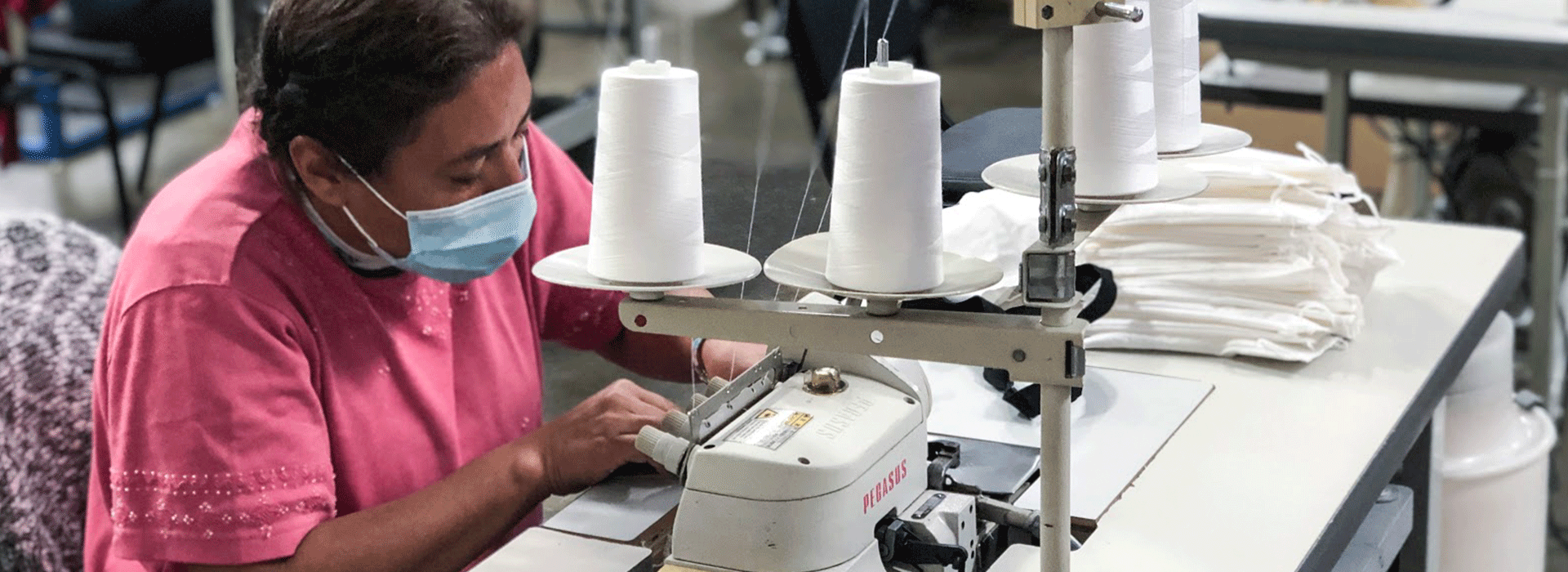Killer Fabrics
By Helen Olsson

Last week, Livinguard, a Swiss company that makes textiles for both health care and outdoor apparel, announced news of a new treated fabric that kills coronavirus on contact. Recent tests conducted at the University of Arizona showed that >99% of human coronavirus 229E that comes into contact with the textile is destroyed. “It works through a process we call ‘continuous capture and kill,’” Livinguard founder Sanjeev Swamy told CNN Europe in a recent interview. “When a microbe is attracted to small charges [on the textile’s surface], the charge bursts it open and it dies.”
The company’s new Livinguard face mask is a reusable multi-barrier system with three separate filtration layers that maintains its coronavirus protection through multiple washes over six months. One mask can replace 210 disposable masks.
The masks are already in use in the Middle East and India, and FDA approval for emergency use in the U.S. is underway. The company hopes to distribute 50 million to 100 million treated masks in 2020.
Because Livinguard’s antimicrobial textile destroys not only coronavirus but odor-causing bacteria, the fabric could have application in the outdoor apparel space. “We’re very excited about bringing our technology to the marketplace,” said Tim Philosophos, U.S. president of Livinguard. “There are many applications across numerous industries that would benefit from it, and that certainly includes outdoor apparel.” For years, outdoor brands have employed fabric with silver, which has antimicrobial properties, to keep garments odor-free. Livinguard’s fabric is an alternative to silver-based yarns for brands that worry about the toxicity of heavy metals.
In mid March, HeiQ, a specialty chemical company that develops textiles for outdoor brands, launched protective masks with Viroblock NPJ03, a new antiviral, antibacterial treatment that was also tested to be effective against human coronavirus 229E. For safety reasons, textile companies cannot use actual SARS-CoV-2, the virus that causes COVID-19, for testing. However both viruses have membranes and scientists believe they can be similarly destroyed.
HeiQ’s fabric deactivates the virus on contact by combining its silver and vesicle technologies. The vesicle tech targets lipid-enveloped viruses, quickly destroying the virus’ membrane and allowing the silver to then kill the virus. In studies, Viroblock increased the protection of masks by more than 30 times compared to untreated masks. On April 30, HeiQ announced it was sharing its proprietary formula for Viroblock with its industry peers, calling for a united effort to fight the COVID-19 pandemic.
HeiQ makes odor-fighting fabrics for outdoor brands like Buff, Outdoor Research, Prana, Mammut, Simms, Kjus, and Burton. “Right now, we are very focused on our antiviral technology,” said Hoi Kwan Lam, HeiQ’s chief marketing officer, from the company’s headquarters in Zurich, Switzerland. “Since we launched Viroblock, our closest partners, including Outdoor Research, have expressed interest.” Several hundred new companies have also reached out. “Half of those are outdoor-sports brands,” she said. While the company can’t reveal all the brands that might use the textile, we think a Buff with Viroblock is a no-brainer.
Meanwhile, Allied Feather + Down, known in the outdoor world for its ethically sourced insulation, has tapped its bedding division to make protective cotton masks, producing 10,000 masks a day for LA’s homeless shelters and first responders in hard-hit New York City.
Allied partnered with Fuze biotech to treat its masks with a cutting-edge fiber infusion that creates a protective barrier against microbes. Fuze targets bacteria, which often serve as hosts for viruses. As bacteria move across a surface in search of food, they come in contact with the Fuze particles, which pierce their membrane shells and kill them. According to the brand, creating an environment that’s inhospitable to bacteria reduces the risk that viruses can live. The treatment means the mask’s barrier will remain effective when worn more than once without washing.